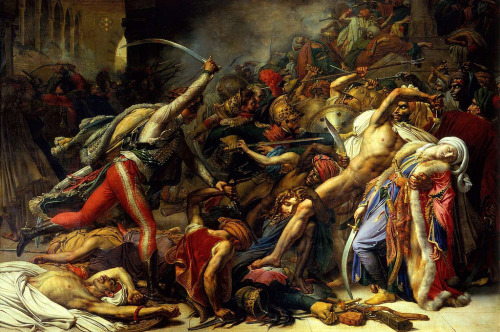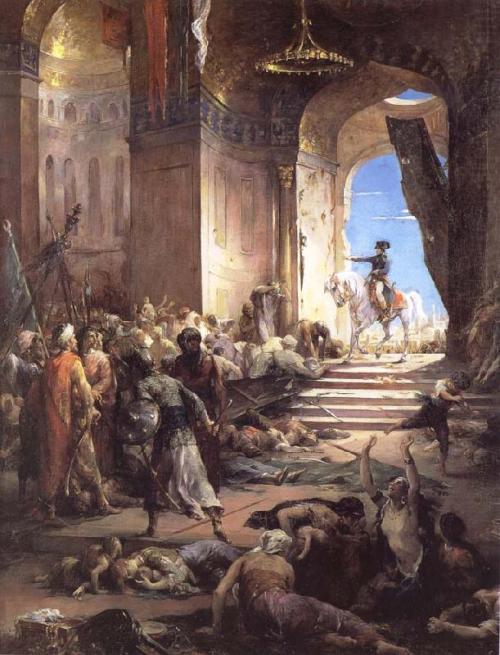peashooter85:Napoleon in Egypt Part III —- Jihad, Revolt, and MassacreClick here for Part I and Part
peashooter85:Napoleon in Egypt Part III —- Jihad, Revolt, and MassacreClick here for Part I and Part II“The French people are a nation of stubborn infidels and unbridled rascals… They look upon the Koran, the Old Testament and the New Testament as fables… If it please Allah, it is reserved for you to preside over their entire destruction.” —- A Manifesto of the Great LordAfter only 4 months in Egypt Napoleon’s position in the ancient nation was growing more tenuous every day. Napoleon cast himself as the liberator of Egypt by commissioning several public works projects to help modernize and improve the country. He even worked with local government and religious leaders to help cement his place as ruler of Egypt. While many Egyptians appreciated the changes, many more saw Napoleon and the French as occupiers, conquerors, and infidels.When Napoleon tried to impose new taxes on the country, and more importantly level a cemetery near his headquarters, unrest turned to rebellion. Incited by local Sheikhs and Imams, the citizens of Cairo began to take up arms. Religious leaders preached the destruction of the French as Egyptians swore by the Prophet to kill any and all French they met. They even had a manifesto, called The Manifesto of the Great Lord which stated,“The French people are a nation of stubborn infidels and unbridled rascals… They look upon the Koran, the Old Testament and the New Testament as fables… Soon, troops as numerous as they are formidable will advance on us by land, at the same time ships of the line as high as the mountains will cover the surface of the seas… If it please Allah, it is reserved for you to preside over their entire destruction ; as dust is scattered by the wind, there will not remain a single vestige of these infidels : for the promise of Allah is formal, the hope of the wicked man will be deceived, and the wicked men will perish. Glory to the Lord of the worlds!”On October 21st, 1798 the citizens of Cairo took to the streets in arms while fortifying positions, setting up barricades, and killing any French who were caught out on the street. Among those killed was the French commander Gen. Dupuy and Joseph Sulkowski, Napoleon’s personal aide-de-camp. To counter the rebellion Napoleon did much the same as he did when he suppressed an uprising in Paris three years earlier. He set up cannon in the streets loaded with grapeshot, and blew away anyone in open revolt in Cairo. Eventually he surrounded the city with his army, fighting street to street while destroying barricades and cutting down any in his way. His objective was to squeeze the rebels into one key section of the city where he could bomb the rebellion into submission. His plan worked, and the rebels were forced to take shelter at The Great Mosque. When a rebel leader begged for mercy in the name of Allah, Napoleon showed none, declaring, “He (Allah) is too late — you’ve begun, now I will finish!” Napoleon ordered a massive bombardment of the Mosque, which heavily damaged the holy building. His troops then stormed the gates, massacring 5,000 to 6,000 Egyptians.After the revolt, several Sheikhs and Imams were rounded up and executed. Important mosques, palaces, and other buildings were demolished and extremely high punitive taxes were placed on the city. Furthermore Napoleon dissolved the local city government and placed Cairo under martial law. He built forts all over the city, turning Cairo into a large armed camp. It was said that even the dogs of the city were killed, lest they sound warning when a French soldier approached.Despite the brutal suppression of the Revolt in Cairo, Napoleon’s position in Egypt was continuing to deteriorate. The people of Egypt were as resentful of the French presence as ever. Worse yet the British Navy began to raid ports along the coast. Perhaps worst of all, the Ottoman Empire was organizing a grand army to invade and take back Egypt.To be Continued… -- source link
Tumblr Blog : peashooter85.tumblr.com

